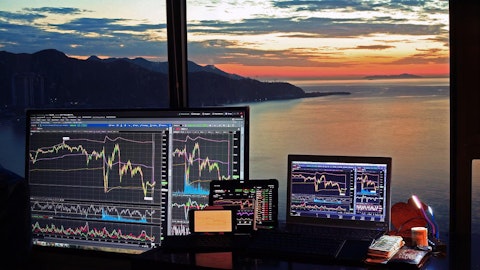We didn’t have any financing risk. We were the buyer of choice. I think we were not even in the top 4 probably in price, but we were the most certain to close. So that gave us an enormous advantage in the process. I think we’ve got a tremendous value on the deal. So our plan there is to put in our professional kind of best practices, put in modern reservation systems. Enhance the property, it was a constrained buyer before. So we have the ability to improve the property. And hopefully, that leads to more satisfied customers that are increased demand and increased revenues at the property.
Floris Van Dijkum: And I think you mentioned it was on 153 acres. I mean is there expansion opportunities here down the road?
Mark Brugger: There are. I mean I think, at first, we’ve owned it for 48 hours. Our first plan is we want to make sure we understand it. There is a lot of land here, and so there are opportunities, but that’s not our initial plan. Our initial plan is to make it a better version of itself, get our arms around it. And the nice thing about these kinds of properties, and this is what we talk about internally is there’s a lot of ways that you can get lucky and when — and so it has a lot of those kind of value creation opportunities. But again, our initial game plan, we’re not promising we’re going to do anything other than make it a better version of itself. And I think that, that alone will make this a very successful investment for DiamondRock.
Floris Van Dijkum: And maybe a last follow-up. Does that mean that you are — does this make you more interested in other properties in the area and sort of to get more of a clustering? Are there other properties nearby that that you would like to have or — in Montana? And does having one stake in the ground allow you to get more opportunities? Or does this basically say, “no, we’re done with Montana. Let’s go to another part of the country”?
Mark Brugger: Remember, this whole investment is $33 million for a company that’s got $4 billion assets. So no, it’s — we’re not full up on Montana. We love Montana, we love the community. We love the prospects. We like Yellowstone. We like Bozeman. We like Big Sky. There are plenty of other opportunities where we’d like to pursue and grow relationships. We’re trying to build our reputation within that community. And hopefully, that will allow us to get off-market transactions. It’s a relatively small community. By being good stewards of asset and building those relationships, we would hope that, that would allow us to get more deals in that state, and we would absolutely expand our footprint there if good opportunities emerged.
Floris Van Dijkum: Thanks, Mark.
Mark Brugger: Thank you.
Operator: Thank you. One moment, please. Our next question comes from the line of Gregory Miller of Truist.
Gregory Miller: Thanks, ‘have you been. Mark, in the prepared remarks, you spoke briefly about NAV, so I thought to ask a question about it. How do you view your internal NAV today relative to a quarter ago? And in particular, if you’re able to comment on the drive-to leisure assets you’ve acquired in the last number of years, I’d be curious to hear about that as well.
Mark Brugger: Yes, it’s a great question. We just had a Board Meeting row this week and we were talking about the same issue. I’d say that the truth is there’s so few data points in the market with volumes being so low that I think anyone that’s telling you a change in value is really just guessing. There seems to be a tremendous amount of money on the sidelines, several hundred billion dollars of private equity that’s interested in real estate that is poised. So there’s a lot of potential buyers that are sitting there. And then I think from the seller’s perspective, a lot of them are sitting in the sidelines feeling like that’s going to get more efficient and cheaper 6, 12 months from now, so why would I bring my assets to market.
So volume is low. It’s hard to know what changes value. Obviously, the fading and some of the performance of the resorts — there’s going to be some valuation change there. But they still remain the conversation of the private equity fund yesterday. It still remains the — one of the most interesting theses in leisure and hotel investments. I think generally, people still believe it’s going to be the place to be over the next 5 to 7 years. And remember, these assets, unlike buying a hotel in, let’s say, San Francisco, these assets have great trailing cash flow, even 6%, 7% compared to 0% in a market like San Francisco or San Jose right now. So they’re still financeable. So they still become the kind of very interesting assets. I know there’s a recent asset trade in Nashville.



